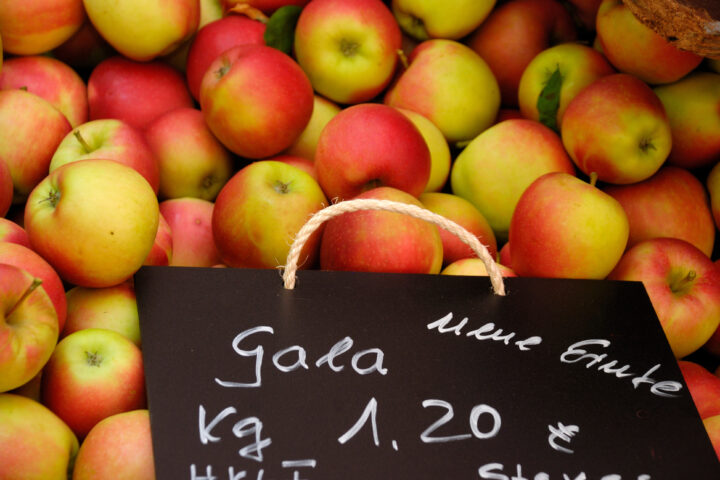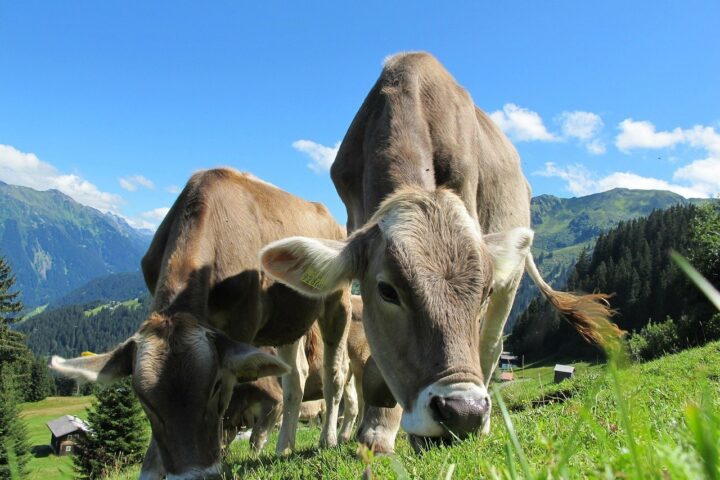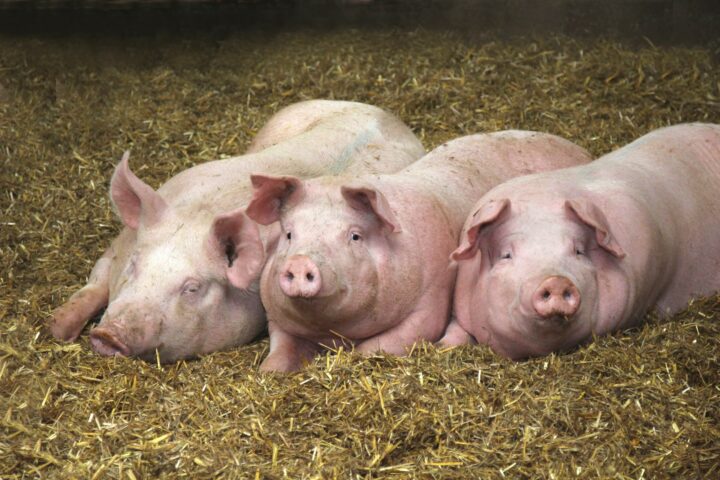
Migros and the opportunities of genome editing
The demand for new breeding technologies is growing. Experts see an urgent need for action in order to utilise technological progress without jeopardising safety. Companies such as Migros also recognise the importance of these developments and are addressing the opportunities and challenges they bring. Meanwhile, contrary to scientific findings, opponents are continuing to tell the same horror stories as they did 30 years ago.
Wednesday, September 11, 2024
In Switzerland, the moratorium on genetic engineering is still a reality. The cultivation of genetically modified organisms is prohibited in this country. However, in view of the growing demand for food and the increase in extreme weather conditions, calls for the authorisation of new breeding technologies are getting louder and louder. Parliament will decide on the ban again in 2025.
ETH plant scientist Bruno Studer emphasises in Migros Magazin that a reassessment of the genetic engineering moratorium is long overdue. The ban was introduced 20 years ago – back then, genetic engineering was still ‘uncharted territory’. ‘Since then, thanks to countless studies, we know a lot more about the benefits and safety of these processes.’ The term ‘genetic engineering’ needs to be defined more precisely. The blanket ban on genetic engineering no longer fulfils its original purpose.
Apples and vines are particularly suitable
It is undisputed that the methods have developed considerably over the last two decades. ‘With new breeding methods, plants can be modified in the same way as they could have been in nature or through conventional breeding – but in a targeted and much more efficient way,’ explains Studer in an interview with the magazine. It is therefore important to create more precise terms and clear distinctions in order to determine which methods should be authorised – and which should not.
According to the researcher, apples and vines are particularly suitable for new breeding methods. Both species are extremely popular in Switzerland, but also leave a corresponding ecological footprint. New breeding methods could be of great benefit here: ‘They could help to improve resistance to diseases such as scab or fire blight in apples or downy and powdery mildew in vines without losing the desirable properties of Gala apples or Pinot grapes.’ For example, the use of pesticides could be significantly reduced.
As Olivier Felix, Head of Sustainable Plant Protection and Varieties at the Federal Office for Agriculture, explains in Migros Magazine, plant protection products still play an important role in agriculture. It would be impossible to do without them completely. ‘If we want to guarantee sufficient domestic products of a high quality, we have to protect the plants as efficiently as possible against diseases, pests and weeds. If insect larvae are present on a product, an entire harvest may not be able to be sold.’ However, this is precisely where policy is currently lagging behind: ‘There is a lack of effective protection against some pests.’
Migros consumer conference on genome editing
One thing is clear: technologies are needed for the sustainable production of large quantities. Politicians would therefore do well to listen to science when it comes to the authorisation of modern plant protection products and new breeding technologies. Migros is open to new breeding technologies and calls on politicians to examine their potential for a sustainable agriculture and food industry. At the consumer conference, it made genetic engineering a topic of discussion. Matija Nuic, Director of the Swiss Vegetable Producers Association, National Councillor Martina Munz and Professor Bruno Studer took part in the panel discussion. The presentations of the speakers and the video of the consumer conference can be found here.
New technologies urgently needed
The fact that Migros is addressing the issue of new breeding technologies gives rise to the hope that the subject is becoming less of a taboo. The opening up of the debate has also been requested by the agricultural sector. ‘If no foreign genetic material is implanted, we definitely see opportunities for the new breeding methods,’ says Nuic. He explains the desire for the application of new technologies among farmers in his industry with the lack of plant protection in Switzerland. In cold and wet years in particular, there are many diseases for which there are no longer any remedies due to restrictive approvals.
More robust high-performance varieties could help to solve some of these problems. On the other hand, Nuic emphasised the need not to close oneself off from developments in new breeding technologies abroad. ‘50% of the vegetables consumed in Switzerland come from abroad,’ he explained. And he expressed clear concerns about stricter Swiss regulation for NBT: the Swiss market is too small to make separate seed production profitable, and a possible legal requirement to separate the flow of goods would further increase the costs of end products. He would therefore like to see an honest discussion, also in the interests of consumers.
30-year-old horror stories
Unfortunately, if you listen to the opponents, this hope quickly fades. The broad repertoire of myths against genetic engineering continues to be played out unchanged. Martina Munz, SP National Councillor and co-initiator of the popular initiative for GMO-free food, speaks of ‘uncontrollable risks’ and corporations that would effectively ‘snatch up everything once the floodgates have been opened’. It denies the scientific consensus on the risk of genome-edited plants. Bruno Studer pointed out that 3000 plant varieties are already based on genetic engineering, ‘and these plants are also cultivated in organic farming’, he assured the audience. Nevertheless, opponents prefer to talk about ‘terminator seeds’, which, according to their diction, would no longer reproduce and would drive small farmers into dependence on large corporations. Martina Munz also considers classical mutagenesis to be dangerous – she does not comment on the fact that this dangerous seed has been cultivated in organic farmers' fields for decades.
Classical mutagenesis is genetic engineering
According to the ECJ, classical mutagenesis is considered genetic engineering. Here, radioactive radiation or chemicals are used to randomly trigger a large number of mutations. The Federal Council also equates mutagenesis with genetic engineering: ‘The two most important conventional genetic engineering techniques in plant breeding are classical mutagenesis and transgenesis.’ When asked whether the initiative of the opponents of genetic engineering is also directed against this breeding technology, which has been established in Switzerland for decades, Martina Munz remained vague. Today, thousands of crops are grown in Switzerland that have been bred using classical mutagenesis. Even pasta from organic food shops cannot be produced without genetic engineering. However, the initiative of the opponents of genetic engineering also describes the random mutagenesis widely used in organic farming as genetic engineering and calls for mandatory labelling. Organic shops would therefore have to label their pasta with radioactive warnings.
Obviously, not much has changed in recent years. Instead of discussing the actual possibilities of new breeding technologies in the plant sector in Switzerland, people prefer to talk about abstruse applications and horror scenarios. Yet we have been planting GMOs worldwide for 25 years. The horror stories have not yet materialised anywhere.
Sources
Kindly note:
We, a non-native editorial team value clear and faultless communication. At times we have to prioritize speed over perfection, utilizing tools, that are still learning.
We are deepL sorry for any observed stylistic or spelling errors.
Related articles

Organic farmer calls for genome editing for fruit growing
The high number of plant protection treatments is a major challenge for organic farmers. One of them is apple grower Marco Messerli from Kirchdorf BE. He has had to treat susceptible apple varieties with organic pesticides a total of 48 times. Too much, he thinks, and is now calling for the authorisation of new breeding methods. Experts agree with him.

Genome editing for livestock farming
More than 800 animal scientists met recently at the annual meeting of the European Federation of Animal Science (EAAP) in Davos, Switzerland, to discuss challenges and solutions relating to the future of livestock breeding and farming.

Gene Editing for Stronger Supply Security in the UK
Russia’s invasion of Ukraine has led to a scarcity of wheat and big price increases for the staple on agricultural commodity markets. The United Kingdom wants to strengthen its domestic supply security by relying on more resistant crops. With this aim in mind, plans call for passing a new law that would allow cultivation of gene-edited plants. Agricultural productivity is once again becoming increasingly important in European countries. Switzerland also needs to produce more.

What’s Really in Your Shopping Basket
Genetic engineering in our shopping basket? Yes – and much more often than we think. Whether it’s pasta, bread or vegetables: many of the everyday products we consume come from mutation breeding, which involves altering the genome and is considered safe. It’s high time to debunk the common myths.

Genomic breeding methods are not given a chance to prove themselves
Modern genomic breeding methods are legally classified as genetic engineering – and are therefore still effectively blocked. Yet we have been eating genetically modified plants for decades, just under the label of “classical mutagenesis.” The new, more precise techniques are regulated more strictly than the old ones, even though they are considered safer from a scientific perspective. A contradiction that urgently needs to be corrected. The EU is setting a good example.

No Pig Business: Why Testicle-Free Boars Are a Clear Win for Animal Welfare
New breeding methods are opening up new possibilities in both plant and animal breeding. They allow targeted genetic changes that can make animals more resilient, adaptable, and healthier.

Stagnation instead of progress: Switzerland risks falling behind in new breeding techniques
An overview article in Schweizer Bauer shows how much the new breeding methods are preoccupying farming circles. Once the consultation process on the federal law has been completed, a bill is expected – then it will become clear whether there is actually the political will to approve it.

